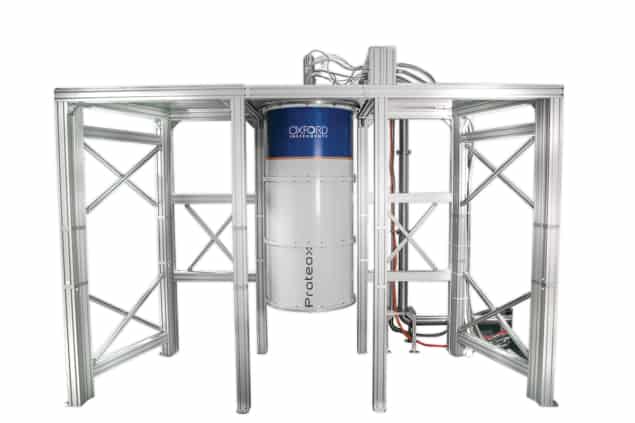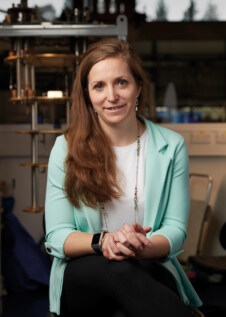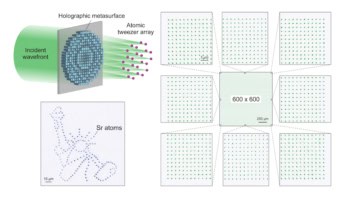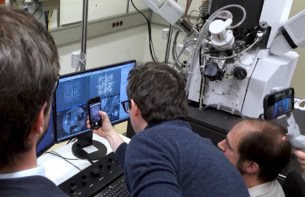Oxford Instruments NanoScience is partnering in a three-year project to create and develop the UK’s first quantum computer capable of running end-user applications in the cloud

The mission to build the UK’s first commercial quantum computer is gathering pace in Abingdon, Oxfordshire, at the facility of Oxford Instruments NanoScience. The UK-based manufacturer of specialist scientific equipment, including the state-of-the-art dilution refrigerators needed to operate quantum systems and other condensed-matter experiments at ultralow temperatures, is part of a consortium that is seeking to deliver a quantum computer that will start running the first end-user applications by the beginning of 2022.
The consortium, backed by a £10m investment that includes funding from the UK government’s Quantum Technologies Challenge, is headed by Rigetti Computing. Headquartered in Berkeley, California, Rigetti has built a series of quantum processors based on superconducting quantum circuits that customers can program via a cloud-based platform. The latest version – the Aspen-9, which was first deployed in February – incorporates 32 qubits, and in this project the company aims to scale up the design still further.

“The system we will build here will be larger than anything we currently have available in the US,” says Anna Stockklauser, Rigetti’s technical lead for quantum engineering. “An initial version of the machine will be available for our UK partners to use early next year, and we will then iterate the design over time. We want to make sure that each part of the machine has been carefully proven before we build a new part of it.”
As well as hosting the hardware installation, Oxford Instruments is responsible for delivering and installing the latest version of its Proteox family of dilution refrigerators, the ProteoxLX, which has been designed to provide the capacity and cooling power needed to operate large-scale quantum computers. Meanwhile, three other partners in the consortium are focused on developing quantum software and applications. The University of Edinburgh is developing new ways to test quantum hardware and the performance of quantum algorithms, and is also working with Standard Chartered Bank to advance quantum-based machine learning applications for the finance sector. The fifth partner, start-up company Phasecraft, is using its expertise in quantum software to develop near-term applications in materials design, energy and pharmaceuticals.
Rigetti will be the first US quantum company to put a commercial quantum computer here in the UK, and it’s amazing for us to be part of the project.
The three application-focused partners are already producing results using Rigetti’s US-based installations, and will switch to the UK machine as soon as it goes online. “Rigetti will be the first US quantum company to put a commercial quantum computer here in the UK, and it’s amazing for us to be part of the project,” says Harriet van der Vliet, product segment manager for quantum technologies at Oxford Instruments NanoScience. “It is particularly exciting to be hosting the build here at our facility, and to know that customers will be accessing the installation via the cloud.”

For Rigetti, establishing a physical presence in the UK offers improved access both to local talent and expertise, and to customers – such as those in financial and government institutions – who for legal and security reasons need to keep their data within the UK. “This is a wonderful opportunity for us to get connected to the vibrant and growing quantum ecosystem in the UK,” says Stockklauser. “It gives us lots of valuable links to great talent and infrastructure, as well as end users located in the UK that we hope will be able to use our machines for new purposes. It’s really good to be a part of the UK’s quantum sector while it is still in the making.”
Stockklauser is also excited to be working with Oxford Instruments for the first time. “Oxford Instruments is one of very few companies who can build machines that are suitable for running superconducting quantum computers,” she continues. “For this programme we knew we would have to do a lot of custom design work to integrate our system into the dilution refrigerator, and Oxford Instruments is a great partner for developing these custom pieces.”
Quantum advantage
The ProteoxLX that Rigetti will be using to build its quantum computer is a new model in Oxford Instruments’ product range, formally released just before the March Meeting of the American Physical Society in March 2021, which has been specifically designed to support quantum scale-up. It offers a significantly larger dilution unit and sample space than the original ProteoxMX, as well as more cooling power at its base temperature – which extends as low as 7 mK. “The mixing chamber plate as the sample stage of the LX has a diameter of 530 mm, compared with 360 mm for the MX,” explains van der Vliet. “It also has two pulse tubes to provide more cooling power at the 4 K stage, which is useful for quantum applications that require large numbers of amplifiers.”
An even more significant advantage for building large-scale quantum computers is the extra capacity the LX provides for installing quantum experiments. All the dilution refrigerators in the Proteox family are equipped with a side-loading “secondary insert” that enables an entire experimental set-up – including samples, communications wiring and signal-conditioning components – to be configured outside the refrigerator and then installed and changed whenever necessary. This modular approach allows experiments to be turned around more quickly, particularly in a multi-user environment, or where a research team might want to test different versions of a quantum chip.
We need a system of the size of the ProteoxLX, and the cooling power it comes with, to be able to scale to systems with large numbers of qubits.
Anna Stockklauser, Rigetti
What’s more, the secondary inserts can be fully customized to meet the needs of the installation. “Researchers who need a number of signal-conditioning components, such as amplifiers, circulators and isolators, often want to configure their wiring in a specific way for their experiments,” explains van der Vliet. “With our customizable solution we share the design drawings of the insert and work with our customers to configure the components exactly how they want them.”

The LX goes one step further by incorporating two of these secondary inserts into the design, rather than one. This essentially doubles the experimental space, offering a combination of flexibility and scalability that has proved to be a winner with Rigetti. “We need a system of the size of the ProteoxLX, and the cooling power it comes with, to be able to scale to systems with large numbers of qubits,” says Stockklauser. “Rigetti is a full-stack quantum computing company – we build the control electronics, the entire software stack, and the hardware that goes into the fridge – and the secondary insert technology has allowed us to work with Oxford Instruments to easily integrate our hardware in the dilution refrigerator with the required customizations.”
One key advantage of this approach is that the secondary inserts can be configured and fabricated before the system is installed, which reduces the time needed to get a quantum experiment up and running. Since the consortium started work in the autumn of 2020, the US and UK companies have been sharing design files to perfect the layout of the two secondary inserts, which has allowed Oxford Instruments to install the ProteoxLX – complete with the customized secondary insert – just six months after the project started.
In the cloud
Now the ProteoxLX has been installed and the final checks have been completed, the system has been fully handed over to Rigetti for the build phase of the project. Quantum engineers from Rigetti’s UK team, including Stockklauser, will be working at the Oxford site. “It’s a great set-up for us because we can run our lab with all of the infrastructure that’s already in place,” says Stockklauser. “Plus we have the expertise right here on site to provide any help we might need with operating the machines.”
For Oxford Instruments, meanwhile, the close collaboration with Rigetti offers a valuable entry point to the world of large-scale quantum computing. “It is great for the UK to have a quantum computer that will be used by customers via the cloud as the majority of commercial quantum computers are based in North America,” says van der Vliet. “This project will be great for quantum in the UK, and it’s fantastic for us as a UK company to be so heavily involved in the project. With the Rigetti team on site, we will continue our collaboration as we build our knowledge of the user experience and ensure that the ProteoxLX meets our evolving customer needs.”




